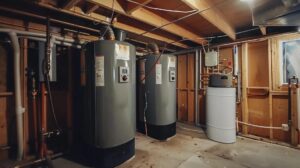Planning Your Water Heater Installation: A Step-by-Step Guide
Installing a new water heater is a significant investment that affects your home’s comfort and energy efficiency. Whether you’re replacing an old unit or upgrading to a more efficient model, proper planning ensures a smooth installation process. This guide will walk you through essential considerations to help you prepare for your water heater installation.
Assess Your Hot Water Needs
Understanding your household’s hot water requirements is crucial in selecting the right water heater. Consider the following:
-
Household Size: Larger families typically require water heaters with greater capacity.
-
Peak Usage Times: Identify when hot water demand is highest to ensure a consistent supply.
-
Appliance Usage: Consider the number of appliances (e.g., dishwashers, washing machines) that use hot water simultaneously.
For example, a family of four with high simultaneous usage may benefit from a tankless water heater, which provides continuous hot water on demand.
Choose the Right Type of Water Heater
There are several types of water heaters, each with its advantages:
-
Tank Water Heaters: Store a specific amount of hot water suitable for households with predictable usage patterns.
-
Tankless Water Heaters: Heat water on demand, offering energy efficiency and a continuous hot water supply.
-
Heat Pump Water Heaters: Use electricity to move heat from the air to heat water, highly efficient, but may require more space.
-
Solar Water Heaters: Utilize solar energy, reducing utility bills, but dependent on sunlight availability.
Consult a professional to determine the best option based on your home’s infrastructure and energy goals.
Determine the Appropriate Size
Selecting the correct size ensures efficiency and meets your hot water needs:
-
Tank Water Heaters: Common sizes range from 40 to 80 gallons.
-
Tankless Water Heaters: Measured by flow rate (gallons per minute); ensure it meets peak demand
An undersized unit may lead to insufficient hot water, while an oversized one can increase energy costs.
Prepare for Installation
Proper preparation can streamline the installation process:
-
Location: Ensure the installation area is accessible and complies with local building codes.
-
Permits: Check if permits are required for installation in your area.
-
Old Unit Removal: Plan to safely remove and dispose of the existing water heater.
-
Plumbing and Electrical: Assess if upgrades are needed to accommodate the new unit.
Hiring a licensed professional can help navigate these requirements effectively.
Budget Considerations
Understanding the costs involved aids in budgeting:
-
Unit Cost: Varies based on type and capacity.
-
Installation Fees: Include labor, permits, and potential upgrades.
-
Operating Costs: Consider energy efficiency and maintenance expenses.
Investing in an energy-efficient model may have higher upfront costs, but can lead to long-term savings.
Schedule Regular Maintenance
Regular maintenance extends the lifespan of your water heater:
-
Annual Inspections: Check for leaks, corrosion, and proper operation.
-
Flushing the Tank: Removes sediment buildup, improving efficiency.
-
Anode Rod Replacement: Prevents tank corrosion
Establishing a maintenance routine can prevent unexpected breakdowns and costly repairs
📞 Contact Hooper Plumbing for Expert Installation
At Hooper Plumbing, we specialize in professional water heater installation tailored to your needs. Our experienced technicians ensure a seamless process from selection to installation.
Ready to upgrade your water heater? Contact us today for a consultation and experience reliable service you can trust.

